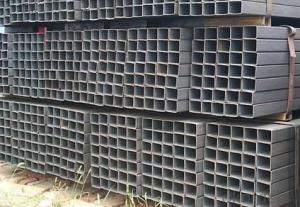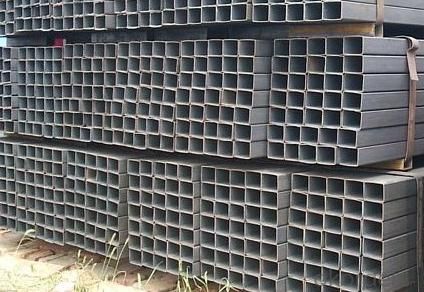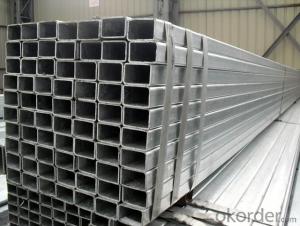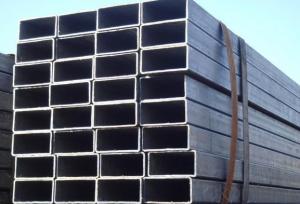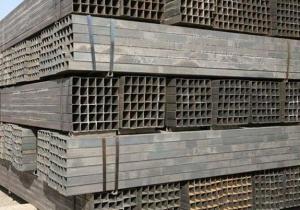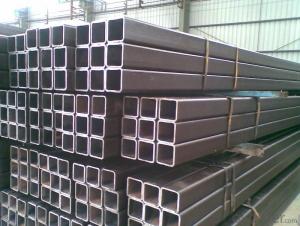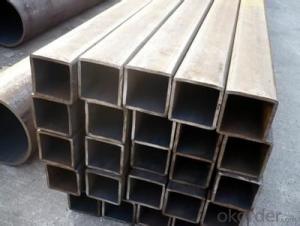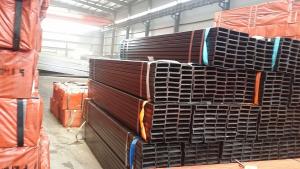Q195/Q215/Q235/Q345 Rectangular hollow section/ RHS
- Loading Port:
- Tianjin
- Payment Terms:
- TT OR LC
- Min Order Qty:
- 10 m.t.
- Supply Capability:
- 5000 m.t./month
OKorder Service Pledge
OKorder Financial Service
You Might Also Like
Product Name | rectangular hollow section/ RHS | |
Size | Size: | 10*10--500*500mm |
Thickness: | 0.45--16mm | |
Length: | 3-12m | |
Steel Grade | Q195,Q215,Q235,Q345,16Mn, 20# | |
Standard | ASTM A500,EN10219,GB/T6728,GB/T6725,JIS G3466 | |
Usage | 1. For Structure, Airport, Railway 2. Construction and so on. | |
Ends | Plain end or By Your Choice | |
Surface | Bared Or With Oiled Or Galvanized | |
Technique | ERW ,Hot Rolled and Cold Rolled | |
Section Shape | Rectangular | |
Inspection | With Hydraulic Testing, Eddy Current , Infrared Test | |
Package | Bags, Bundle, In Bulk, Containers | |
MOQ | 20 Metric Ton / Can Be Negotiated | |
Supply Ability | 15,000 Metric Ton/Month | |
Date of Delivery | 7 days(Qty within 1000 Metric Ton) or According To The Quantity | |
Port of Shipment | Tianjin, China | |
Payment | L/C T/T | |
- Q: What are the safety regulations for working with steel pipes?
- The safety regulations for working with steel pipes may vary depending on the specific circumstances and location, but some common safety measures include wearing appropriate personal protective equipment (PPE) such as gloves, safety glasses, and steel-toed boots, ensuring proper handling techniques to prevent injuries, using proper lifting equipment to prevent strain or back injuries, implementing proper ventilation and respiratory protection when working in confined or poorly ventilated spaces, and following proper procedures for welding, cutting, or bending steel pipes to minimize the risk of fire or explosions. It is essential to consult and adhere to local safety regulations and guidelines to ensure a safe working environment when dealing with steel pipes.
- Q: Can steel pipes be used for brewery installations?
- Yes, steel pipes can be used for brewery installations. Steel pipes are often used in breweries for various applications such as transferring fluids, connecting equipment, and creating plumbing systems. Steel pipes are known for their durability, strength, and resistance to corrosion, which makes them suitable for handling the harsh conditions and high-pressure environments typically found in brewery installations. Additionally, steel pipes can be welded together, allowing for seamless connections, ensuring a reliable and leak-free operation. However, it is important to ensure that the steel pipes used in brewery installations meet the necessary standards and regulations to ensure the safety and quality of the beer production process.
- Q: Are steel pipes suitable for underground compressed air systems?
- Generally, steel pipes are suitable for underground compressed air systems. They are a popular choice due to several advantages they possess. First and foremost, steel pipes are renowned for their strength and durability. This enables them to withstand the pressure and stress associated with compressed air systems. They can handle high operating pressures without the risk of bursting or leaking. Secondly, steel pipes exhibit excellent resistance to corrosion. They can endure exposure to moisture, soil, and other elements found underground. This reliability makes them ideal for underground installations where pipes may encounter potentially corrosive substances. Moreover, steel pipes are relatively easy to install and maintain. They can be securely connected through welding or threading, ensuring a leak-free connection. Additionally, inspecting and repairing steel pipes is a simple process, allowing for cost-effective maintenance and repairs. Nevertheless, it is important to consider other factors that may impact the suitability of steel pipes for underground compressed air systems, such as specific requirements and conditions. Consulting a professional engineer or qualified expert is advisable to determine the most appropriate choice for a particular application.
- Q: How do you calculate the bending moment of a steel pipe?
- To determine the bending moment of a steel pipe, one must take into account both the applied load and the structural characteristics of the pipe. The bending moment quantifies the internal forces within the pipe caused by the applied load. To calculate the bending moment, one can use the following equation: Bending Moment = Load x Distance In this equation, the load represents the external force acting on the pipe, and the distance refers to the separation between the point of load application and the point where the bending moment is being evaluated. For an accurate bending moment calculation, it is necessary to consider the properties of the steel pipe. These properties encompass the pipe's cross-sectional area, second moment of area (also known as the moment of inertia), and the modulus of elasticity. The second moment of area demonstrates the pipe's resistance to bending and can be computed based on the dimensions of the pipe's cross-section. The modulus of elasticity signifies the pipe's stiffness and can be obtained from material properties data. Once the load, distance, cross-sectional area, moment of inertia, and modulus of elasticity are determined, they can be inputted into the bending moment equation to ascertain the bending moment for the steel pipe. It is important to recognize that the calculation of bending moment assumes linear elastic behavior, which implies that the pipe does not surpass its elastic limit nor undergo plastic deformation. If the pipe is exposed to loads surpassing its capacity, the bending moment calculation may not accurately depict the actual behavior of the pipe. In such instances, it is recommended to consult a structural engineer or employ more sophisticated analysis methods to precisely evaluate the bending moment.
- Q: Can steel pipes be used for the construction of railway tracks?
- No, steel pipes are not suitable for the construction of railway tracks. Railway tracks require specialized rails made of steel that are specifically designed to withstand the heavy loads and constant wear and tear associated with train traffic. Pipes do not have the necessary shape, strength, or durability to serve as railway tracks.
- Q: Can steel pipes be used for mining applications?
- Yes, steel pipes can be used for mining applications. Steel pipes are known for their strength, durability, and resistance to extreme conditions, making them suitable for various mining activities such as transporting water, air, or chemicals, as well as for structural support and ventilation systems in mines.
- Q: How is the steel pipe dance installed at home?
- Portable pipe with instructions and CD can be installed, portable steel pipe of a new patent, convenient installation, no restriction site, no drilling, readily removable, adjustable height, stainless steel, solid.
- Q: What are the typical lengths of steel pipes?
- The typical lengths of steel pipes vary depending on the industry and application. However, common lengths for steel pipes range from 18 to 40 feet.
- Q: How are steel pipes used in the manufacturing of wind turbines?
- Steel pipes are used in the manufacturing of wind turbines primarily for constructing the tower, which provides structural support and stability to the turbine. These steel pipes are typically large in diameter to withstand the strong winds and carry the weight of the turbine components. Additionally, steel pipes are also utilized for the transmission of electrical cables within the turbine, ensuring efficient power generation.
- Q: What are the advantages of using steel pipes in the manufacturing of furniture?
- There are several advantages of using steel pipes in the manufacturing of furniture. Firstly, steel pipes offer exceptional strength and durability, ensuring that the furniture will be long-lasting and capable of withstanding heavy use. Secondly, steel pipes are highly resistant to corrosion, making them suitable for both indoor and outdoor furniture. Additionally, steel pipes provide a sleek and modern aesthetic, adding a touch of sophistication to the furniture design. Lastly, steel pipes are relatively lightweight compared to other materials like wood or concrete, making transportation and installation easier. Overall, using steel pipes in furniture manufacturing offers a combination of strength, durability, aesthetic appeal, and practicality.
Send your message to us
Q195/Q215/Q235/Q345 Rectangular hollow section/ RHS
- Loading Port:
- Tianjin
- Payment Terms:
- TT OR LC
- Min Order Qty:
- 10 m.t.
- Supply Capability:
- 5000 m.t./month
OKorder Service Pledge
OKorder Financial Service
Similar products
Hot products
Hot Searches
Related keywords
